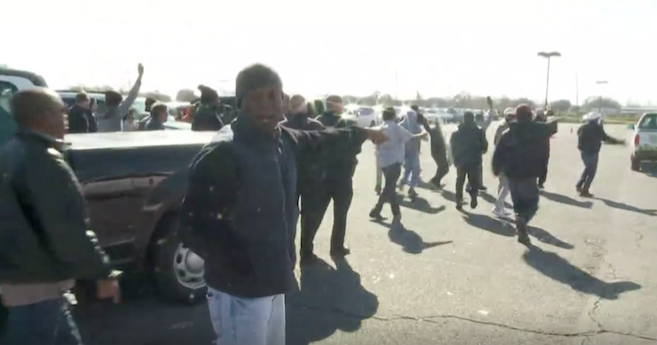
by Joseph Rosen
As permitting fees, insurance and other compliance costs go up, and business is increasingly lost to Uber and Lyft, cab drivers and their families are finding it hard to survive in New Orleans. These drivers kept the city going for decades, and now they are being discriminated against.
On Jan. 4, several dozen cab drivers working at Louis Armstrong International Airport decided they’d had enough. That morning the City of Kenner’s Dept. of Inspections and Code Enforcement showed up to issue citations for alleged violations of a city permitting law. One worker refused to comply; within minutes, dozens of other workers were protesting by his side. They insisted that there was no legal basis for the citation, that the workers had already paid the fees. When the inspector called in Kenner cops for “backup,” the workers stood their ground. When he finally gave up and drove away from the lot, the workers cheered.
These cab drivers were not merely contesting an unjust fee; they were protesting the lack of respect for their hard work. These cab drivers can lose a day’s work or more if, for example, an inspector decides their vehicle’s tires don’t pass muster. In addition to inspection fines and the cost of repairs, every hour that the vehicle is in the shop is an hour of potential income lost. This can mean the difference between making rent or not. As cab driver Jean Ligonde put it: “Our job is very stressful: every time you see a city inspector, you don’t know what’s going to happen.”
“They’re trying to squeeze us out.” This was how a cab driver named Nadgi put it. He was referring to Uber and Lyft which are not subject to these regulations. Their armies of high paid lobbyists and lawyers have bribed the city into granting them special status as “Transportation Network Companies” as opposed to “Taxicab or For-Hire Vehicles” which is what they obviously are.
In 2012, the New Orleans city council passed 24 ordinances requiring cab drivers to purchase new vehicles, buy and install new meters, surveillance cameras, credit card machines, and GPS systems. Apart from the thousands of dollars cost to upgrade each cab, these changes increased maintenance costs and added items subject to inspection. The drivers are being assessed a 4.5% reduction in their fares for every payment made through the credit card machine company that the city contracts with.
Less than two years after the city passed these ordinances, and after months of lobbying city and state officials, Uber entered the New Orleans market. Uber and Lyft now have most of the ground transportation market. This is bad news for all workers in the taxi industry, “gig” and career alike: last year an MIT study concluded that more than 50% of Uber drivers were making less than the minimum wage in their state. No worker should tolerate poverty wages.
Driver Jean Ligonde sees a lesson in the Jan. 4 protest at the airport: “I think if we’d started earlier, a lot of the things we have on our back would have gone away. They keep taking advantage of us because we do not have unity, and they exploit that weakness.” In order to defend ourselves against the enemies of the working-class, whether they sit in city councils, on the boards of Uber and Lyft or in the cab of a cop car, taxi drivers must stand up for taxi drivers, must stand up for Uber drivers, must stand up for workers. We should all support them.
